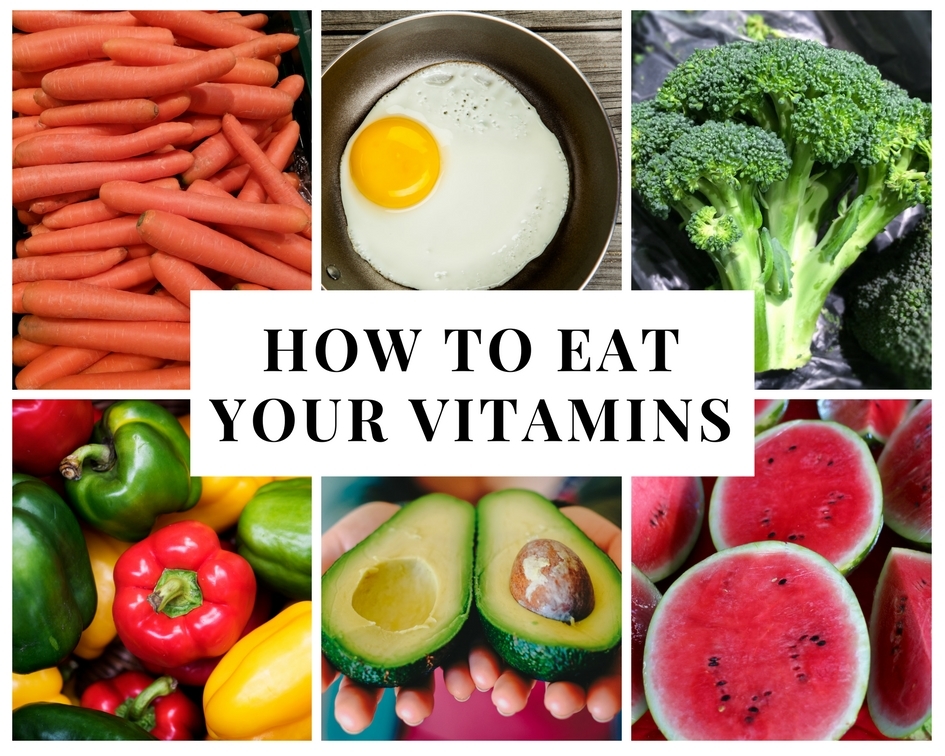A daily vitamin can help you fill in the gaps when it comes to getting all your nutrients, but research consistently shows that nutrients are always best absorbed from food!. Here is how to eat your vitamins.
Fat Soluble Vitamins
If taken too much in supplement form, these can be harmful. However, you can never get too much from whole food sources.
Vitamin A
Keeps your tissues, bones, and skin healthy and happy. It also functions as a potent antioxidant.
Best food sources (anything orange):
- Sweet potatoes
- Carrots
- Butternut squash
- Pumpkin
Vitamin D
Helps maintain normal levels of calcium and phosphorus in the blood, strengthens bones and teeth.
Best food sources:
- Fatty fish
- Fortified milk or non-dairy milk
- Tofu
Vitamin E
A potent antioxidant that boosts the immune system promotes tissue repair and improves blood flow.
Best food sources:
- Almonds (including almond butter)
- Spinach
- Avocado
Vitamin K
Helps the body maintain healthy bones and clot appropriately.
Best food sources (anything green and leafy):
- Kale
- Collard greens
- Spinach
Choline
Sometimes referred to as Vitamin B4, this vitamin is essential for fat transport and metabolism. It’s also a vital component of acetylcholine, an important neurotransmitter.
Best food sources:
- Eggs
- Milk
- Peanuts
Water Soluble Vitamins
It is harder (but not impossible) to induce toxicity in supplement form of these vitamins, but you could waste your money. If you aren’t absorbing it, you are releasing these in your urine, which means you are wasting money. Here is how to get these vitamins from food:
Vitamin B1 – Thiamin
Supports energy metabolism and nerve function.
Best food sources:
- Most animal products are rich in thiamin
- Watermelon
- Sunflower seeds
Vitamin B2 – Riboflavin
Helps your body convert food into energy, breaking down fat, protein, and carbohydrate.
Best food sources:
- Dairy products such as milk and cheese
- Spinach
- Broccoli
Vitamin B3 – Niacin
Helps support energy metabolism and healthy digestion.
Best food sources:
- Meat/Fish
- Dairy
- Eggs
- Spinach
Vitamin B5 (Pantothenic Acid)
Help turn food into energy and promotes proper neurotransmitter function.
Best food sources:
- Meat
- Beans
- Avocado
Vitamin B6 (Pyridoxine)
Helps convert energy into food and assists in red blood cell production.
Best food sources:
- Banana
- Watermelon
- Chicken
Vitamin B12
Helps to make new cells, helps produce energy from food, and helps with nerve transmission.
Best food sources (can only be obtained from animal foods):
- Dairy
- Meats
- Poultry
- Fish
Vitamin C
A potent antioxidant that helps with wound healing and immunity.
Best sources:
- Potatoes
- Bell peppers
- Oranges
Folic Acid
Helps with making new cells and prevents neural tube defects if taken in early pregnancy.
Best food sources:
- Green leafy vegetables
- Broccoli
- Legumes
Minerals
There are a couple of minerals you should pay close attention to. They play a significant role in optimal health.
Potassium
Reduces the risk of many diseases, fights the effects of sodium intake, and helps nerve/muscle function.
Best food sources:
- Potato
- Avocado
- Banana
Calcium
Keeps bones and teeth strong. Vital for nerve and muscle function as well!
Best food sources:
- Dairy products
- Fortified non-dairy substitutes
- Broccoli
Magnesium
Involved in over 300 enzymatic reactions in the body, promotes muscle relaxation, strong bones, and teeth.
Best food sources (anything green):
- Leafy vegetables – darker green the better
- Broccoli
- Avocado
